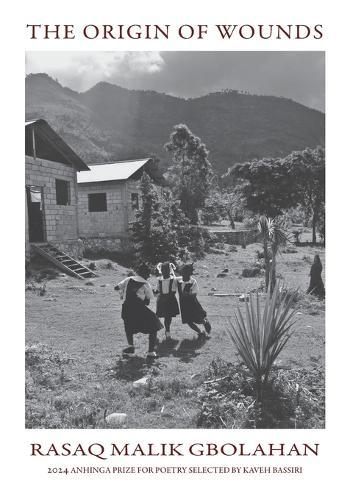Overview
Winner of the 2024 Anhinga Prize for Poetry, Rasaq Malik Gbolahan's ""The Origin of Wounds"" exhumes fragments of historical accounts that bring us face-to-face with the brutality of national and global wars. Malik's pivotal poems address personal and global grief through the loss of homeland, the loss of beloveds, and the continuous search for a sanctuary. He presents to us diverse ways we can engage moments steeped in unrest and conflict, while weaving poems that honor both the living and dead. In poems that startle and astonish, Rasaq Malik Gbolahan shows unflinchingly the excruciating lives of children in war-torn homelands, while also guiding us through diaries of war notes and archives of forgotten wounds. Through the poems in ""The Origin of Wounds,"" Rasaq Malik Gbolahan's remarkable visions as a poet brighten across the pages as he reflects on the past, the present, and the future. He renders powerfully the experiences of the displaced, the migrants on boats leaving homeland to an imagined promised land. He examines the wounds of displacement, the wounds of migrants, of ancestors on slave ships and dreams buried in the dark of war. Malik reminds us through his poems that we must pay attention to the wounds carried from the past to the present, and we must also do everything possible to save the children from a world fraught with monumental tragedies. Kaveh Bassiri, Judge for 2024 Anhinga Prize for Poetry describes ""The Origin of Wounds"" as a haunting dirge for loss, where ""natives weigh their dreams / on the scale of war."" Though rooted in Nigeria, the poems resonate globally, from the Middle East and South America to the United States and its mass shootings. Malik is a lucid truthsayer of our time, and his poems are prayers of remembrance, in which ""the hand of history / still reaches from the dark room of forgetfulness."" Each line, each poem, stands witness, building a mourning procession that leads the reader toward praise - praise of ""the ancestors for carrying us through / the storm of the world."" -
Full Product Details
Author: Rasaq Malik Gbolahan
Publisher: Anhinga Press
Imprint: Anhinga Press
Dimensions:
Width: 17.80cm
, Height: 0.70cm
, Length: 25.40cm
Weight: 0.245kg
ISBN: 9781934695944
ISBN 10: 1934695947
Pages: 98
Publication Date: 10 December 2025
Audience:
General/trade
,
General
Format: Paperback
Publisher's Status: Active
Availability: Not yet available

This item is yet to be released. You can pre-order this item and we will dispatch it to you upon its release.
Author Information
Rasaq Malik Gbolahan is a Nigerian poet, performer, translator, essayist, and an emerging DH scholar. The founding Editor-in-Chief of Agbowó, he is also a cofounder of Àtélẹwó, the first digital journal devoted to publishing literary work written in the Yorùbá language. He is the author of the poetry chapbooks No Home In This Land, selected for Chapbook Box edited by Kwame Dawes and Chris Abani, and The Other Names of Grief, published by Konya Shamsrumi. His work has appeared or is forthcoming in POETRY, Ploughshares, Kenyon Review, African American Review, Beloit, Colorado Review, Crab Orchard Review, LitHub, Michigan Quarterly Review, Minnesota Review, New Orleans Review, Prairie Schooner, Poet Lore, Rattle, Salt Hill, Spillway, Stand, Verse Daily, and elsewhere. He received Honorable Mention in the 2015 Best of the Net for his poem ""Elegy,"" published in One. In 2017, Rattle and Poet Lore nominated his poems for the Pushcart Prize. He was shortlisted for Brunel International African Poetry Prize in 2017. He was a finalist for Sillerman First Book for African Poets in 2018. His co-edited anthology, African Urban Echoes, was published in Spring 2025 by Griots Lounge, Canada. At press time, he was a PhD student at the University of Nebraska-Lincoln. He also was working on a Yorùbá novel and a translation project.



